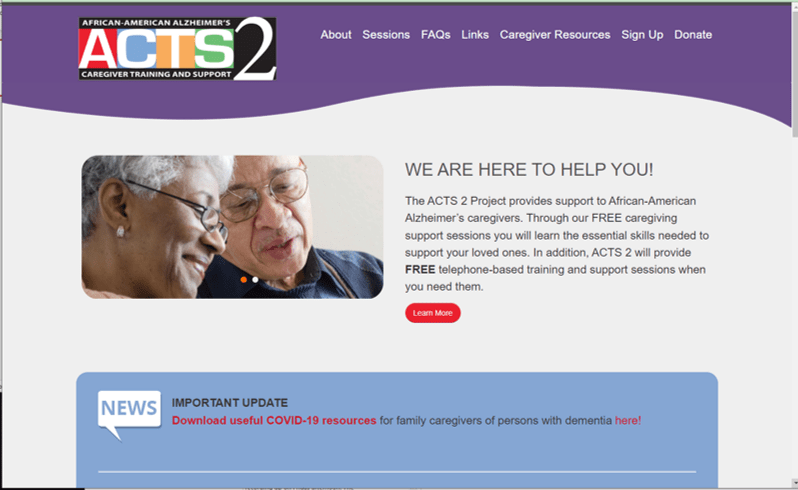My IDEA Grant is focused on the “Development of Dementia-Friendly Guidelines for the Black Faith Community: Caregiver Focus Group Analysis.” To give some context on how this came about, approximately 6.2 million adults in the United States have Alzheimer’s disease and closely related conditions. Alzheimer’s disease is currently the sixth-leading cause of death in the US and the fifth leading cause of death among adults 65 years and older. Furthermore, progressive dementia has been of particular concern for the Black community because of the disproportionate rate of Alzheimer’s disease in Black people compared to non-Hispanic Whites. Black older adults are twice as likely to develop Alzheimer disease than their non-Hispanic White counterparts. The high prevalence of dementia among older Black adults is significant because of the substantial dependence on performing activities of daily living, causing an impact on a person with the condition, their families, and the healthcare system.

Because of the demands on family caregivers, they often report psychological distress, restrictions in social activities, and financial difficulties that, in turn, put the caregivers at high risk for depression and new cardiovascular disease. In assessing the demands of dementia caregiving across races, Black caregivers spend significantly more time providing direct care and higher level of family income than other caregiver groups, which renders them more vulnerable to high burden from caregiving.
Coping strategies and social support have been found to moderate and mediate caregiver distress and physical health in family caregivers of persons living with dementia. However, therapists, treatment protocols, and therapy settings geared to the majority White population may be culturally discordant with the preferences, beliefs, and values of a large proportion of African Americans. Black caregivers have used spiritually coping mechanisms in their faith community. While that has been shown to be beneficial, Black caregivers often have limited access to culturally responsive dementia education and training programs to improve their mental health, reduce caregiver burden, and improve care for their family members living with dementia. As a result, the ACTS 2 program at FSU College of Medicine has made it its mission to provide faith-integrated skills training and support to distressed Black caregivers of family members with dementia across Florida.

While the ACTS 2 program has played a significant role in integrating faith and formal dementia education for Black caregivers, the focus of my IDEA grant is to determine how best to support the Black faith community in creating an environment that is dementia friendly and optimally engages Black family caregivers and their loved ones with dementia. Prior research has found that Black adults were twice as likely as their non-Hispanic White counterparts to seek assistance from church ministries when they had mental health problems. Overall, this project aims to develop guidelines for the Black faith community to enhance involvement of Black caregivers and their loved ones with dementia. The specific objectives of this project are the following: (1) to gather information about the experiences of Black caregivers and their loved ones with dementia interacting with clergy and church lay leaders in the faith community environment, and (2) to advance knowledge about the best methods for ensuring active and meaningful involvement of Black adults with dementia and their care partners in the faith community, social, and community activities. We used a focus group methodology to collect this information.
In conducting the IDEA grant, I first reviewed the informed consent procedures and subsequently collected background information from 11 Black family caregivers. I then created an Excel spreadsheet of the information they provided me and shared it with my supervisor Dr. Robert Glueckauf and two research colleagues (Nik Lampe and Tomeka Norton-Brown). Prior to conducting the focus group session, I contacted all of the caregivers individually and created a group chat that included the Black family caregivers, my supervisor Dr. Robert Glueckauf, Nik Lampe, Tomeka Norton, and myself in case they had any questions, comments or concerns before the session occurred.
During the caregiver focus group, caregiver participants were asked: (1) how they and their family members living with dementia have participated and connected with their faith communities, (2) successes and challenges they have faced in engaging persons with dementia and themselves in faith community activities, and (3) the resources they need to support further the involvement of people with dementia, themselves, and their families in the faith community. The focus group session was conducted using Zoom and was video-recorded. Additionally, note-taking occurred to record process-related observations, follow-up queries, and future areas of investigation. Three caregivers were either unable to complete the focus group session or portions of it. Individual session were conducted to gather data from these three caregivers. Audio-recordings of the caregiver focus group session and the individual sessions were transcribed using NVivo transcription software. I quality checked the generated transcript for accuracy and to de-identified the participants responses.
Note that the ACTS2 project is a collaborative, community-based initiative. The ACTS2 advisory board, consisting of Black faith leaders and community spokespersons, guided the initial development of this project. ACTS2 also has strong support across the state of Florida including four major African-American church denominations, Florida Department of Elder Affairs’ Alzheimer’s Disease Initiative, Florida Area Agencies on Aging, and Mayo Clinic Jacksonville. Moreover, I would like to add that my supervising professor is Dr. Rob Glueckauf, Director, ACTS2 Project, and Professor, Florida State University, College of Medicine, Dept. of Behavioral Sciences and Social Medicine. I have been a research assistant with the ACTS2 program for over a year and a half. Dr. Glueckauf has played a significant role in developing dementia-friendly guidelines; he has supported me with this project and will advise me, moving forward as this project progresses.